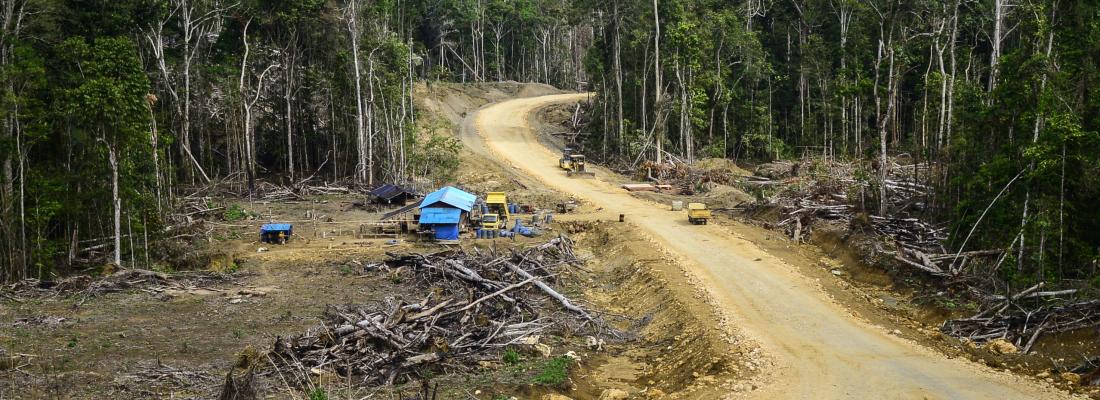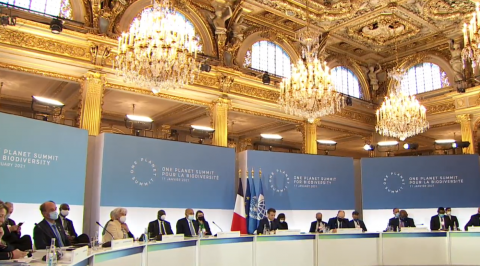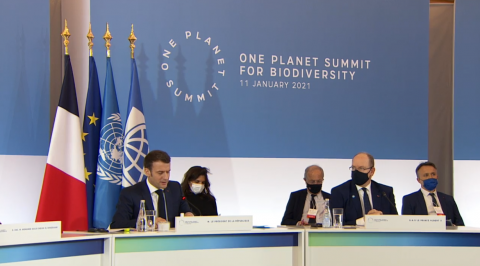Food, Global Health Reading time 3 min
One Planet Summit: launch of PREZODE, a first-ever international initiative to prevent future pandemics
Published on 12 January 2021

Over the past 50 years, the emergence of health crises linked to zoonoses has been picking up speed. Indeed, some 75% of these human infectious diseases which originate from animal reservoirs are due to pressure exerted on biodiversity. The crisis linked to the COVID-19 pandemic has shaken the world, taking a very heavy human, economic and social toll. Now more than ever, a One Health approach that does not separate human health, animal welfare and the environment is in order, to prevent or manage new pandemics. Viruses and bacteria that plague man are multiplying and their recurrence seems to be a given. That is why it is crucial that science stay a step ahead of future health crises by anticipating the risks of emerging diseases and detecting them early on, to be able to take steps before disease spreads. Several studies have shown that investing in disease prevention would significantly reduce the cost of having to deal with crises.
The PREZODE initiative aims to keep the risk of emerging zoonoses and pandemics in check. It is built on and strengthens existing cooperation between regions of the world (Africa, Asia, Caribbean, Indian Ocean, Mediterranean, Middle East, Latin America and Europe) that are most exposed to emerging zoonotic diseases. PREZODE is designed to incorporate and reinforce networks in human health, animal welfare and the environment. In line with the One Health concept, it aims to better evaluate and detect emerging zoonotic threats and develop preventive measures with all players to protect humans, the planet, and socio-ecosystems. And in doing so, PREZODE reduces the threat of pandemics.
Five pillars, five working groups
This initiative is in line with the creation of the One-Health*** High-Level Expert Council announced on 12 November 2020 at the Paris Peace Forum. As stated by Mr Qu Dongyu, Director General of the FAO: “We commend the PREZODE programme which initiates global cooperation which could play a major role in the science which guides our decisions and actions at all levels. We fully support PREZODE and believe that it can provide factual orientations that are needed on the priorities of the interinstitutional work on One Health, in particular concerning the integrity of ecosystems, biodiversity and health activities”.
The PREZODE initiative is in line with recent recommendations of the report on biodiversity and pandemics published by IPBES**** in October 2020.
The five pillars of PREZODE are:
- Zoonotic risk analysis
- Reducing zoonotic risk
- Early detection and evaluation of socio-economic impacts
- An international zoonotic risk-monitoring system
- Stakeholder engagement and joint development of regional health and biodiversity networks.
Discussions during the One Planet Summit on January 11th:


|
|
Right and reliable socio-ecosystems
The goal of the initiative is to build the right socio-ecosystems that are resilient and reduce the risk of emerging zoonoses while strengthening biodiversity and combatting poverty and food insecurity. PREZODE aims to unite and complete many existing projects. The joint effort of researchers, local communities and policy-makers to find the right solutions should ultimately lead to: identifying and reducing the main factors at the root of emerging zoonosis risks; jointly developing policies that do not separate human health, animal welfare and biodiversity; One Health monitoring systems in real time; and strengthened public-private partnerships and open dialogue between science, policy-makers, and society.
A research-action programme ready to go in 2022
In 2021, PREZODE will outline a scientific and strategic plan of action, put a governance system in place, and draw up a road map, all complete with performance indicators. A digital platform for collecting and sharing data will also be set up jointly with all stakeholders. Partners will also run, both at global level and in relevant countries and regions, an analysis of the steps needed to incorporate health systems (in terms of the environment, animals and humans) and biodiversity by combining research (including social sciences) and practical steps decided with local communities. This first-ever programme of research and concrete action will thus be ready to go in 2022.
“I am very pleased with the PREZODE initiative (…) The world needs health for all, by all, for One Health, therefore let’s act holistically, coherently, collectively and historically!”, Mr Qu Dongyu, Director General of the FAO.
|
Reference Marisa Peyre, Gwenaël Vourc'h, Thierry Lefrançois, Yves Martin-Prevel, Jean-François Soussana, Benjamin Roche. PREZODE: preventing zoonotic disease emergence. The Lancet Volume 397, ISSUE 10276, P792-793, February 27, 2021 DOI: https://doi.org/10.1016/S0140-6736(21)00265-8 |
Link
Building the PREZODE international initiative for Preventing Zoonotic Disease EmergenceSeveral regional workshops which were held from 14 to 17 December and a plenary session on 18 December 2020 were organized at the initiative of INRAE, CIRAD and the IRD to bring together international research forces in order to prevent the risk of the emergence of zoonoses. They involved almost 400 participants from 50 countries on 5 continents, half of whom are actors in the field of biodiversity, environmental, animal and human health and half are researchers.
The highlights of the preparatory discussions on video:
* In France, notably with ANSES, the Institut Pasteur, INSERM, CNRS and CNES; in Germany with Helmholtz, the Friedrich Loeffler Institute and the Charité Institute of Virology; and in the Netherlands with Wageningen University.
** WHO: World Health Organisation – OIE: World Organisation for Animal Health – FAO: Food and Agriculture Organization – UNEP: United Nations Environment Programme.
***The “One Health” High-Level Expert Council announced on 12 November 2020 at the Paris Peace Forum at the initiative of France, Germany, the WHO, OIE, FAO and UNEP.
****Intergovernmental Science-Policy Platform on Biodiversity and Ecosystem Services
